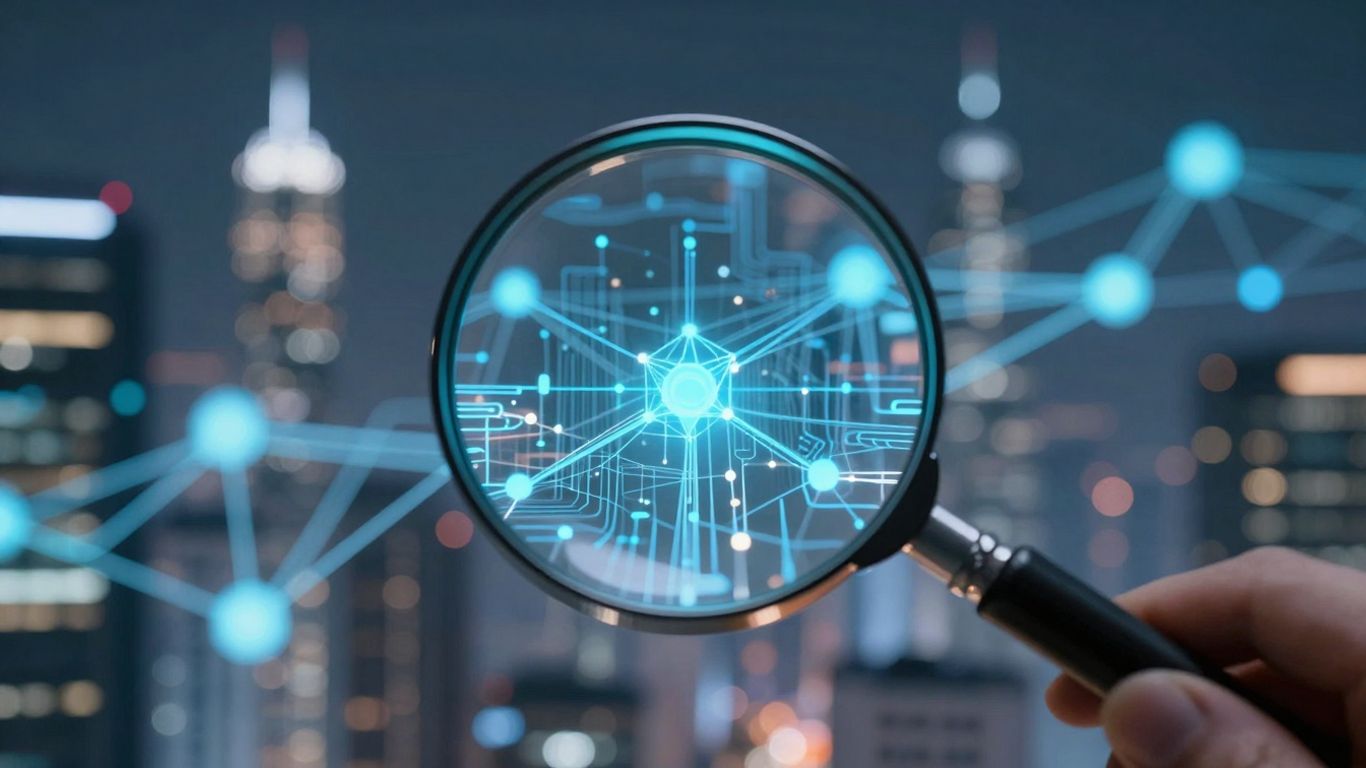[ newsletter ]
Stay ahead of Web3 threats—subscribe to our newsletter for the latest in blockchain security insights and updates.
Thank you! Your submission has been received!
Oops! Something went wrong. Please try again.
Explore smart identity AI agents in 2025. Understand their capabilities, benefits, and challenges in transforming digital security and identity management.





The way we think about digital identity is changing, and fast. By 2025, we're going to see a big shift with smart identity AI agents. These aren't just simple tools; they're like digital assistants that can manage our identity information. They learn, they adapt, and they can even make decisions on their own. This means better security, but also new things to consider. Let's break down what this means for us.

Digital identity has become a really big deal, right? It's not just about logging into your email anymore. Think about everything we do online: banking, shopping, even just chatting with friends. Each of those interactions builds up a picture of who we are in the digital world. This landscape is always changing, getting more complex as new technologies pop up. We're moving beyond simple usernames and passwords, which, let's be honest, aren't that secure anyway. The goal is to have a digital identity that's both robust and easy to manage, something that can keep up with how we live our lives today.
Artificial intelligence is really shaking things up when it comes to proving who you are online. Instead of just relying on something you know (like a password) or something you have (like a phone for a code), AI can look at a whole bunch of factors. It can analyze how you type, how you move your mouse, or even the typical times and places you log in. This makes authentication much smarter and harder for bad actors to crack. It’s like having a really observant security guard who knows your habits.
This is where things get really interesting. Agentic AI takes things a step further. Instead of just helping with authentication, these AI agents can actually manage your identity. They can act on your behalf, making decisions and taking actions without you having to tell them to do it every single time. Imagine an agent that automatically updates your access permissions when your job role changes, or one that can spot unusual activity and shut down access before any real damage is done. It’s a shift from systems that just react to ones that can proactively manage and protect your digital self. This kind of autonomy is what’s going to define the next generation of identity security.
Smart Identity AI Agents are built to be more than just passive tools; they're designed to actively manage and secure digital identities. Think of them as highly specialized digital assistants that can handle complex identity and access management (IAM) tasks on their own.
One of the biggest game-changers is their ability to make decisions and act without needing a human to tell them what to do every single step of the way. They can assess risks in real-time, like checking if a login attempt is coming from an unusual location or device. Based on this assessment, they can automatically adjust access levels, perhaps requiring an extra verification step or even blocking access if the risk is too high. This means things like granting, changing, or revoking user access can happen automatically when a role changes or a policy is updated, which really speeds things up and cuts down on errors. They're constantly learning and adapting, so their decision-making gets better over time.
These agents can handle tasks like dynamic identity management, continuous access monitoring, policy enforcement, and threat response, all without manual input. This autonomy is key to keeping up with the fast-paced digital world.
These AI agents aren't static. They're built to learn from every interaction and every piece of data they process. This means they get smarter about identifying normal user behavior versus suspicious activity. For example, they can learn your typical login times and locations. If a login happens at 3 AM from a country you've never visited, the agent flags it. This continuous learning allows them to adapt to new threats and changing user patterns, making them more effective over time. They can also adapt security policies on the fly based on emerging risks, ensuring that security measures stay relevant.
Smart Identity AI Agents are designed to fit into existing systems and workflows. They can connect with various applications and platforms through APIs, automating tasks that would normally require a lot of manual effort. Imagine automating the entire onboarding process for new employees – from creating their accounts to assigning the right access permissions. These agents can manage the whole lifecycle of an identity, from creation to retirement, making sure everything is handled correctly and efficiently. This automation not only saves time but also reduces the chances of human error in critical security processes, like improving identity verification.
Here’s a quick look at what they can automate:
Smart identity AI agents are really changing the game when it comes to keeping things secure. They're not just about reacting to threats; they're built to be proactive, learning and adapting as they go. This means they can spot unusual activity much faster than older systems, often before it even becomes a problem. Think of it like having a super-vigilant security guard who knows everyone's usual routine and can immediately tell if something's off.
These AI agents are pretty good at spotting weird patterns. They look at things like login times, locations, device types, and how a user normally interacts with systems. If something deviates, like a login from an unexpected place or a sudden change in typical behavior, the agent flags it. This continuous monitoring helps catch things like compromised credentials or insider threats early on. For instance, organizations using agentic AI in identity and access management (IAM) have seen significant reductions in breach costs, sometimes by as much as 80%. It's a big shift from just relying on passwords, which we all know can be pretty weak.
The ability of these agents to process vast amounts of data in real-time allows for a much more nuanced approach to security, moving beyond simple rule-based systems to truly intelligent threat mitigation.
Identity governance can be a real headache, involving a lot of manual work to manage who has access to what. Smart identity AI agents automate a lot of this. They can handle user onboarding, offboarding, and access reviews much more efficiently. This not only saves time but also reduces the chance of human error, like accidentally leaving access open for someone who no longer needs it. This automation is key for keeping up with the fast pace of modern organizations and makes sure that access controls are always up-to-date and appropriate. It’s about making sure the right people have the right access, at the right time, and that this access is properly managed throughout their tenure.
When a security breach happens, the costs can be astronomical, not just in terms of financial loss but also reputational damage. By improving threat detection and streamlining identity governance, smart identity AI agents directly help lower these risks. Faster detection means quicker response, which can significantly limit the impact of an incident. Automating tasks also reduces the operational burden on IT and security teams, freeing them up to focus on more strategic initiatives. Ultimately, this leads to a more resilient security posture and a more efficient operation. For example, some reports suggest that agentic AI can cut down provisioning times by about 50%, which is a huge operational win. AI enhances identity verification through biometrics and behavioral analysis, making systems more secure and user-friendly.
So, what does this all mean in practice? Smart identity AI agents aren't just theoretical concepts; they're starting to show up in some pretty interesting ways, making our digital lives both more secure and, honestly, a lot less of a hassle. Think about how much time we spend proving who we are online. These agents are designed to handle a lot of that heavy lifting.
Identity and Access Management (IAM) is notoriously complex. It involves keeping track of who has access to what, making sure that access is appropriate, and revoking it when it's no longer needed. This is where AI agents really shine. They can automate the tedious parts, like onboarding new employees by automatically assigning the right permissions based on their role, or offboarding them by swiftly removing all access. It's not just about speed, though. These agents can also analyze access patterns to spot anomalies that might indicate a compromised account, something a human might miss in a sea of data. This kind of automation helps reduce errors and frees up security teams to focus on more strategic tasks.
Forget static access rules. Smart identity AI agents can implement dynamic access controls that adapt in real-time based on user behavior and context. For example, if an employee suddenly starts accessing sensitive files from an unusual location or at an odd hour, the AI agent can automatically adjust their access level or require additional verification. This is a big step up from traditional methods that often rely on fixed roles and permissions. It means that access isn't just granted; it's continuously evaluated and adjusted, providing a much more granular and responsive security posture. This adaptive approach is particularly useful in high-security environments.
One of the most significant benefits is the shift from reactive security to proactive risk mitigation. Instead of waiting for a breach to happen, these AI agents can constantly monitor for potential threats and vulnerabilities. They can analyze vast amounts of data to predict where risks might emerge, whether it's a new phishing campaign targeting your users or a potential insider threat. By identifying these risks early, organizations can take steps to prevent them before they cause damage. This proactive stance is also incredibly helpful for maintaining compliance with various regulations. The agents can help ensure that access policies are consistently applied and that all activities are logged for audit purposes, making it easier to meet stringent requirements. This capability is crucial for organizations looking to stay ahead of evolving threats.
The ability of these agents to learn and adapt means they can continuously improve their security functions over time. As they encounter new patterns of behavior or new types of threats, they update their models, becoming more effective at identifying and responding to risks. This ongoing learning process is key to staying secure in an ever-changing digital landscape.

While the promise of smart identity AI agents is huge, we're not quite at a point where we can just switch them on and forget about them. There are some pretty big hurdles to clear before these systems are truly ready for prime time.
These AI agents are going to be sifting through a ton of personal information – think login times, locations, device types, and how you actually use your accounts. That's a lot of sensitive stuff. If these systems aren't locked down tight, there's a real risk of data leaks or misuse. Plus, the whole idea of an AI making decisions about your access based on its analysis of your behavior brings up some tricky ethical questions. We need to be super clear about how this data is used and stored, and make sure people have a say in how these automated decisions affect them. It’s not just about security; it’s about fairness too.
Sometimes, these AI models, especially the really complex ones, can be like a black box. It’s hard to figure out exactly why an agent decided to grant or deny access. This lack of clarity makes it tough for IT folks to explain decisions, especially during audits or if something goes wrong. If we can't understand how the AI is making its choices, it's going to be a lot harder to trust it, and even harder to prove we're following the rules.
It’s easy to get too comfortable with automation, right? But if we rely too much on AI agents without keeping a close eye on them, we could run into trouble. Errors or biases in the AI could get amplified and spread quickly. What happens when the AI makes a mistake, or when a situation pops up that the AI wasn't trained for? We still need human oversight and the ability to step in and correct things when necessary. Having backup plans and making sure humans are still in the loop is pretty important.
Most organizations aren't starting from scratch. They have older systems that might not play nicely with new AI technology. Getting these smart agents to work with existing identity management tools can be a real headache. Data might be stored in different formats, making it hard for the AI to get a complete picture. A poorly managed integration could lead to disruptions or even security gaps, so a careful, phased approach is definitely needed.
The rules around AI and data privacy are always changing. Keeping smart identity AI agents compliant with all these evolving regulations is a constant challenge. While AI can help automate compliance checks, it needs to be smart enough to adapt to new laws and requirements. Plus, figuring out who's responsible when an AI makes a mistake – the developer, the user, the organization? – is a whole other can of worms that needs to be sorted out.
Looking ahead, the evolution of smart identity AI agents is set to become even more sophisticated, moving towards interconnected systems and predictive capabilities. We're seeing a clear trend towards multi-agent coordination, where individual AI agents work together to achieve complex security goals. Think of it like a highly specialized team, where each member has a distinct role and can communicate and collaborate autonomously to tackle sophisticated threats.
This collaborative approach is crucial for several reasons:
Beyond collaboration, the future lies in proactive risk mitigation strategies. Instead of just reacting to threats, these AI agents will increasingly predict potential vulnerabilities and unauthorized access attempts before they even occur. By analyzing vast datasets of user behavior, system logs, and external threat intelligence, they can anticipate malicious activities and implement preventative measures. This could involve automatically adjusting access privileges, flagging suspicious patterns for human review, or even isolating potentially compromised systems.
The shift is from a reactive security posture to a predictive and preventative one, fundamentally changing how we manage digital identities and protect sensitive information.
While AI agents will handle more complex tasks, the human element remains important. The future will likely involve a symbiotic relationship where AI agents augment human capabilities, handling routine and complex analytical tasks, while humans focus on strategic oversight, ethical considerations, and handling novel or ambiguous situations that require human judgment. This partnership will be key to building truly resilient and trustworthy digital identity systems. For instance, AI can streamline the verification process for digital identities, but human oversight is still needed to ensure fairness and address edge cases.
So, as we wrap up our look at smart identity AI agents in 2025, it's clear we're on the edge of something big. These aren't just fancy tools; they're becoming like digital partners, helping us manage our online lives more securely and efficiently. Think about how much easier it will be to handle everything from personal data to complex financial transactions when AI agents are doing the heavy lifting. We've seen how they can spot trouble before it happens and even fix things automatically. It’s a pretty exciting shift, moving us towards a future where our digital identities are better protected and easier to manage. The progress here is rapid, and it’s going to keep changing how we interact online, making things safer and, hopefully, a lot less complicated for everyone involved.
Think of smart identity AI agents as super-smart digital helpers. They use artificial intelligence to manage and protect your online identity. They can do things like check who you are, decide if you should be allowed access to something, and learn over time to get even better at their job, all without needing a person to tell them what to do every single step of the way.
These AI agents can handle many tasks automatically, like checking identities or giving out access. This makes things faster and reduces mistakes. They can also learn from new threats and adapt, making your digital identity safer than ever before. It's like having a security guard who never sleeps and is always learning new tricks to keep you safe.
That's a really important question! While these AI agents can be very helpful, it's crucial to be aware of privacy. They handle a lot of personal data, so we need to make sure they are built with strong privacy rules and that we understand how our data is being used. It's about finding a balance between powerful AI and keeping your information secure and private.
Sometimes, it's hard for even the creators to know exactly why a complex AI made a specific choice. This is called the 'black box' problem. For identity AI, it's important that we can understand and explain their decisions, especially if something goes wrong. Companies are working hard to make these AI systems more open and understandable.
Many companies still use older computer systems. Connecting new AI agents to these older systems can be tricky. It's like trying to plug a new smartphone into an old radio – they might not speak the same 'language.' So, getting them to work together smoothly takes careful planning and sometimes custom adjustments.
The future looks very exciting! We'll likely see many AI agents working together, like a team, to provide even stronger security. They'll become better at predicting and stopping threats before they even happen. Plus, they'll keep getting smarter and more helpful, making our online lives safer and easier.


